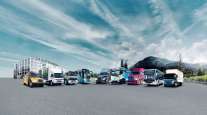Daimler Paves Way to Potential Spinoffs With Separation Plan

Daimler AG, battered by allegations it colluded with other German carmakers for decades, is studying a legal separation of its businesses, including cars, trucks, vans and financial services, in a move that could pave the way for future spinoffs.
Setting its divisions up with more autonomy comes as Daimler looks for ways to make them more nimble for growth in respective markets, as “that’s the best way to safeguard for the future,” Chief Financial Officer Bodo Uebber said July 26 on a call with reporters. He denied the Stuttgart, Germany-based company is preparing to sell any units.
Daimler has long been criticized by investors for hanging onto its broad range of offerings, which span diminutive Smart cars, Mercedes-Benz luxury sedans, Freightliner highway haulers and Thomas Built school buses. The manufacturer has been resistant to a breakup, but times are changing with the advent of electric vehicles and self-driving technologies.
While Daimler cautioned that it needs time to explore the issue, the process is welcome and could be a harbinger for change, with CEO Dieter Zetsche’s contract set to end in 2019, according to Arndt Ellinghorst, a London-based analyst with Evercore ISI.
“This was a deliberate new statement from management, and we recommend taking this communication very seriously,” Ellinghorst said in a note. “Shareholders would applaud such moves.”
Truck Troubles
With the plans for legal separation, Daimler is responding to far-reaching changes that are rendering its business more complex with the addition of self-driving features and new services like car sharing and ride hailing. Uebber highlighted a previous push in 2013 that divided Daimler business units more distinctly to shorten decision-making processes.
Daimler’s trucks division, in particular, has had a rocky run in the past year. In May 2016, the company warned that profits would fall significantly after it was slow to adapt to flagging demand in North America and the Middle East. Then in February, trucks chief Wolfgang Bernhard abruptly stepped down. In April, the unit announced plans to eliminate jobs as part of an effort to lower costs by 400 million euros ($465 million). The Daimler division’s profit margin narrowed to 6% in the second quarter from 7.2% a year ago.
Meanwhile, the revitalized Mercedes car unit, which overtook BMW as the world’s bestselling luxury-auto brand last year, reported a 70% surge in second-quarter profit, boosting its margin to 10.2% from 6.4%.
While Daimler’s trucks business has been struggling with tepid demand in North and South America, the commercial vehicles industry doesn’t face the same level of disruption as the passenger car sector. Electrification is unlikely to replace diesel as the main propulsion technology for Daimler’s mainstay heavy trucks anytime soon. Truckmakers also aren’t targeted by probes about their emissions practices, and the likes of Uber Technologies Inc. and Alphabet Inc.’s Waymo aren’t looming to disrupt the industry.
“A spinoff would definitely create shareholder value, but we’ve had this discussion at length over the past 10 years,” said Michael Dean, senior European automotive analyst with Bloomberg Intelligence. “Daimler has knocked it back at every turn.”




